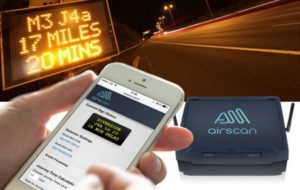I n June 2015, Highways England’s began a ‘new approach to roadworks’ pilot scheme which ‘sets out roadworks to help improve customers’ experience and contribute to a safer environment for both them and roadworkers’. This new approach has elevated the ‘customer experience’ to new levels by use of additional journey time information, easily distinguishable signing and a more consistent overall approach.
n June 2015, Highways England’s began a ‘new approach to roadworks’ pilot scheme which ‘sets out roadworks to help improve customers’ experience and contribute to a safer environment for both them and roadworkers’. This new approach has elevated the ‘customer experience’ to new levels by use of additional journey time information, easily distinguishable signing and a more consistent overall approach.
To complement this approach, Colas has worked on a new initiative on the M3 Smart Motorway Project for main contractor, Balfour Beatty, that is revolutionising the approach to the provision and management of diversion routes. The programme of improvements provided by Colas includes the use of accurate and timely diversion route journey information, active monitoring of routes, improved signing and collaboration with adjoining road authorities. The provision of accurate and timely journey information for road users through use of Automatic Number Plate Recognition (ANPR) is now common through workzones but is not used specifically on diversion routes for a number of reasons.
Diversion routes may vary in location and route on a night by night basis, therefore requiring considerable amounts of costly and less mobile equipment to be used to ensure coverage. In addition, the constraints of urban diversion routes commonly mean that the ANPR equipment that is required to be mounted on high level poles or trailers cannot be safely and easily positioned.
A new generation of sensors that analyse annonymised data from Bluetooth and WiFi devices in passing vehicles is now being used for journey time applications. “Airscan”, a new system developed by Colas and mobile technology specialists Iknaia uses this cost-effective sensor technology and can be quickly and easily deployed on diversion routes. The system can calculate journey time and provides real-time accurate information to VMS, while informing works supervisors of any traffic congestion, such as that caused by collisions. The technology was proven during early trials where traffic congestion occurred due to conflicting diversion route signing of adjoining local authority works and issues with traffic signals. A mobile application used to configure and monitor the Airscan system informed the site team of a change in journey time and allowed the strategic deployment of a Traffic Management™ team to assess and respond to the issue. Historically these issues would have been identified only through reports from customers using the diversion route or when conducting routine maintenance checks.
As part of this system, Traffic Management™ teams are also issued with Bluetooth Low Energy (BLE) tags that are used to locate the teams and ensure that required checks are conducted at the correct intervals by ‘checking in’ staff as they pass the sensors on the route. In addition to the use of technology and pro-active management of diversion route issues, Colas have worked tirelessly with Balfour Beatty to provide higher quality diversion signing on the M3 Smart scheme which is well in excess of the core requirements specified in Chapter 8 and initial Traffic Management™ designs. The signing clearly identifies the route and has resulted in a considerable improvement in customer experience and satisfaction. The use of Bluetooth/WiFi sensor technology has also been used to monitor particular junctions, where, because of local signing and signalling clutter, diversion route signing may have traditionally been difficult to follow. The system identified these areas with quantifiable data and provided evidence that confirmed improvements.
Further improvements to the management of diversion routes have also been led by Colas who have liaised closely with local authorities and other traffic management and works providers in the local area to ensure that conflicting diversion route signing was not placed and that diversions were complimentary. The use of strategic maintenance checks within time windows where other conflicting Traffic Management™ would be installed also helped to identify issues in a timely manner and allowed for an efficient and effective response. This approach to diversion routes piloted by Colas raises the bar for the industry and provides continuity between the ‘new approach to roadworks’ pilot scheme used on main routes by Highways England and again demonstrates Colas’ commitment to continual improvement to our customers’ experience of roadworks.